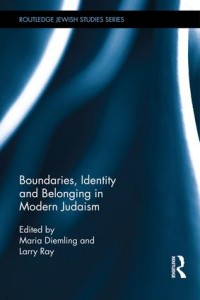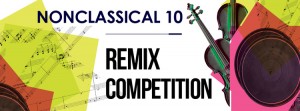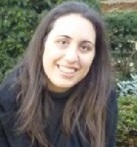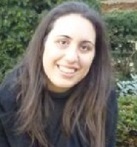 Dr Diana Salazar, Lecturer in Music, has been awarded the International Computer Music Association Regional Award for Europe 2015. Dr Salazar was awarded the prize for her 5.1 fixed media work ‘Rewind [Modus Operandi]’. The work was selected for performance at this year’s International Computer Music Conference in Texas last month, and a stereo version of the work will be released later this year on a CD publication featuring selected works from this year’s conference. The work will also be performed in the Bernaola Festival in Spain in November.
Dr Diana Salazar, Lecturer in Music, has been awarded the International Computer Music Association Regional Award for Europe 2015. Dr Salazar was awarded the prize for her 5.1 fixed media work ‘Rewind [Modus Operandi]’. The work was selected for performance at this year’s International Computer Music Conference in Texas last month, and a stereo version of the work will be released later this year on a CD publication featuring selected works from this year’s conference. The work will also be performed in the Bernaola Festival in Spain in November.
Author Archives: Diana Salazar
New publication by PhD student Miranda Crowdus

PhD student Miranda Crowdus has published a chapter in the new book Boundaries, Identity and Belonging in Modern Judaism (Routledge). The work is a collection of interdisciplinary scholarship relating to contemporary Jewish identity. Miranda’s chapter explores negotiations of Jewishness at recent Palestinian Hip Hop performances in the Tel Aviv-Yafo underground.
City Hosts School Outreach Day, featuring an iPad Orchestra Premiere

The iPad orchestra, featuring three primary schools from across the UK, performed to a large audience in the Performance Space
On the 19th of May City hosted an outreach event involving children from three different primary schools from across the country. As well as participating in workshops on film music and gamelan, they performed an original piece of music on iPads and watched a performance by members of the City University Experimental Ensemble.
The Two Rivers project was originally developed by Ben Sellers of Transformance Music, an iPad music education organisation based in London, and Matthew Hogg of Chiltern Primary School in Hull, to bring three schools together to collaborate to create new music with contemporary technology. The children wrote Garageband compositions based on their experiences of the place in which they live and on their respective rivers, the Humber and the Thames. They also learned to perform songs by other artists, from Madness to Beethoven, using various apps. Throughout this development process the three schools updated each other, communicating using their instruments to send video postcards and rehearsal footage. This allowed them to get to know both their partner schools, and the specificity and multiplicity of behaviour that these technologies afford.
The final piece performed in City University’s concert space is composed of sections and fragments of these children’s own compositions and the pieces they had learned to perform during their instrumental development—a postmodern collage of their recent education in music. With focus which one would not expect at such a young age (age 10-13), and the charms and quirks which one does, the amount of effort put into this piece by both children and adults shone through. Moreover, the idiosyncrasies present in the children’s original compositions had not been ironed out by the project leaders—only weaved into a cohesive structure and modified for the ensemble—still exhibiting the excitement and innocence of a child at play. The range of compositional styles and approaches which could be heard within the melting pot of the work too, showed the range of musics and techniques which these children have been exposed to by the project leaders. Not only does this dialog between theory and practice aid the children’s understanding of music, but it introduces them to the critical perspective one must take toward music in later study.
The collaboration between Transformance Music and City University not only gave this project a platform and an opportunity for a performance, but contributed to the continuing development of these children’s education. Dr. Diana Salazar (Lecturer in Music) is a regular contributor to Widening Participation and Outreach events at City, and was keen to provide the children with knowledge about the opportunities for further study that an education in music affords. Performing in an acoustically-treated concert hall, eating in the student canteen, and rehearsing in an ensemble room amongst a variety of Western and non-Western instruments—these all help to give an insight into what university music departments are, and what university students do—an insight which many students have to wait until the first open day they attend at the end of their A-Levels to receive.

During the day Gamelan expert Andy Channing delivered Javanese Gamelan workshops to two classes of pupils from Sandringham Primary School
A performance by both myself and Phd researcher in informatics, Daniel Wölffe, on handmade electronic instruments built in a workshop conducted by the composer John Richards, showed these children the potential and diversity of music technology. The reception for these interactive, skin-conductive instruments and our performance on them was astounding, when the aesthetic of the sounds they produce could easily be seen as noise, and noise-music is often associated with very niche musical communities and styles. The workings of the core circuitry in this piece is extended twice over—into an arrangement of nails on the instrument itself, and then to connections between mine and Daniel’s hands—making the abstracted and seemingly complex working of electronics tangible and gestural. Showing these students that the technologies used to create music are not restricted to the use of the newest and most expensive hardware and software, reinforces the idea of the artist and musician as a creator, rather than a consumer.
Collaborations such as this, between community-based projects and academic institutions, are significant in that they nurture the relationship between the academy and the society which surrounds it, and break down ideas about ivory-tower academics which are still rife outside of scholarly circles. Moreover, this partnership showed both primary school children and their teachers the various trajectories which one can progress down for a future in both music and music technology, and that these are many and not limited to their previous conceptions of what the academic study of music concerns. Events such as these are important for reaching out to the next generation of students, and showing them that a future in music is worth pursuing and that higher education is a valid and valuable avenue down which to pursue it.
Sam Kendall, current MA (Music) student
China and Hong Kong Recruitment Visit
In April Dr Diana Salazar, Lecturer in Music, Admissions Tutor and INTO Link Tutor, travelled to China and Hong Kong to deliver a number of presentations about the Music Department at City University London. She travelled to Beijing, Guangzhou, Shenyang and Hong Kong where her schedule of activities included speaking at ‘Visit London Roadshow’ events, talking to Higher Education agencies, liaising with INTO regional representatives, visiting School counsellors and prospective students, and delivering interactive workshops. All of the presentations and meetings focused on City’s BMus undergraduate degree and City’s new International Foundation Programme in Music, which is run in partnership with INTO. Highlights of the visit included a performance workshop and presentation with Huafu School students and regional music teachers in Guangzhou (pictured), and the Visit London Roadshow events that brought together education agents and advisors from various regions (Guangzhou event, pictured)

Dr Diana Salazar (centre) with students, staff and invited regional music teachers at Huafu School, Guangzhou

Dr Diana Salazar with educational agent and advisor attendees at the Visit London Roadshow event, Guangzhou
Marie Saunders presents at ‘Understanding Scotland Musically’ conference
Marie Saunders, who is working towards her PhD in Ethnomusicology at City, recently presented a paper at the Understanding Scotland Musically Conference, sponsored by the AHRC and held at Newcastle University, 20-21 October 2014. The title of her paper was ‘Understanding Scotland differently: intergenerational musical reception amongst the London-Scottish diaspora’. Her paper was prompted by reflections on evidence from primary research she carried out in London among two different age groups drawn from members of London’s Scottish diaspora. The data from her current ethnographic research in progress is beginning to suggest a definite shift in perceptions of what Scottish music is. Responses about Scottish music differed from those gathered in her earlier research carried out in 2010. Three patterns are beginning to emerge: little connection with bagpipe music, the prominent place of Indie bands indicating new identity markers for Scottish music and the importance of audience participation, ‘musicking’(Small,C.,1998), with reference to Indie Concerts, ceilidh bands and the Proclaimers. It remains to be seen whether these patterns will be maintained or challenged as the quota of interviews moves toward completion in 2015.

Dr Diana Salazar Wins Nonclassical Remix Competition
Dr Diana Salazar‘s remix of Tansy Davies‘ ‘Neon’ has been awarded a prize in the Nonclassical Remix Competition. Composers were invited to submit remixes of one of three contemporary instrumental works by Gabriel Prokofiev, Tansy Davies or Gary Carpenter. Full information on the prizewinners and runners-up can be found here and you can listen to Diana’s winning work 1s2_2s2_2p6 here. The work will shortly be released on a Nonclassical EP or album.
MA Student Sam Kendall Shortlisted for Oxford/Sennheiser Electronic Music Prize
Congratulations to MA Music student Sam Kendall, who has been selected as a finalist in the Oxford/Sennheiser Electronic Music Prize (OSEMP). The structure and materials of Sam’s shortlisted electroacoustic work ‘One Fast Move or I’m Gone’ are strongly influenced by Jack Kerouac’s novel Big Sur. Sam will diffuse the work at the OSEMP finalists’ concert in the Jacqueline Du Pré Music Building, Oxford University on 8th November 2014.
Joe Perkins (MA Composition) Reflects on his Summer Internship
Joe Perkins (pictured, right) graduated from the BMus programme in July 2014 and has spent this summer completing an internship with award-winning production company Brains and Hunch before he commences the MA in Composition at City this September. We asked him about his experience of the internship:
‘My recent internship with Tom Haines and Chris Branch at ‘Brains and Hunch – Music for Moving Image’ has been an invaluable experience. My understanding of work in a professional studio, such as recording techniques, equipment maintenance, administration, and collaborative work, have all been greatly improved. My other responsibilities involved working with various different theatre companies, such as Filter Theatre and Shunt Events. I have also been assistant sound engineer for a production called ‘The Circus’, which was performed at Edinburgh Fringe this year. This introduced me to new software such as Qlab and Soundflower. In addition, I have been offered further work with Shunt Theatre as a regular performer with my Gypsy Jazz ensemble, ‘Nouveau Gadjo’. My mentors Tom and Chris have helped me greatly with my understanding of composing for moving image, various recording and mixing techniques, an understanding of analog synthesizers/sequencers, Max MSP, Pro Tools and instrument building. I would highly recommend the internship experience!’
PhD Student Christina Michael Presents in Germany and Greece
Christina Michael, who is in the third year of her PhD at City, will be delivering a conference paper on the 30th of September entitled ‘Issues of Authenticity and National Identity in Greek Popular Music: The Entechno Laiko [art-popular] tradition’. Her paper will be part of The Languages of Popular Music: Communicating Regional Musics in a Globalized World conference, which will take place in Osnabruck, Germany between 29th of September and the 2nd of October 2014.
Following this, Christina will be presenting a paper on the 2nd of October entitled ‘The employment of cultural and musical continuity in Manos Hadjidakis’ 1949 Lecture on Rebetiko’ for the conference Continuities, Discontinuities, Ruptures in the Greek World (1204-2014): Economy, Society, History, Literature, which will take place in Thessaloniki, Greece between the 2nd and 5th of October 2014.
Conference Presentation by PhD Student Christina Michael
Third year PhD student Christina Michael will be presenting a paper at the conference ‘Spaces and Places in the Theory and Practice of Greek and Roman Drama‘, which takes place from 30 June to 1 July at the Central School of Speech and Drama (University of London) and Oxford University. Christina’s paper is entitled ‘A Musical Approach of Ancient Greek Comedy on Modern Greek Stage: The Compositions for Plato, Lysistrata and Birds by Manos Hadjidakis’.






